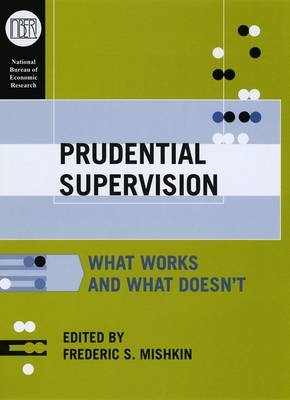
Prudential Supervision
What Works and What Doesn't
Seiten
2002
University of Chicago Press (Verlag)
978-0-226-53188-5 (ISBN)
University of Chicago Press (Verlag)
978-0-226-53188-5 (ISBN)
- Titel z.Zt. nicht lieferbar
- Versandkostenfrei
- Auch auf Rechnung
- Artikel merken
Since banking systems play a crucial role in maintaining the overall health of the economy, the adverse effects of poorly supervised systems may be quite severe. This text examines the state of prudential supervision, focusing on fundamental issues and key pragmatic concerns.
Since banking systems play a crucial role in maintaining the overall health of the economy, the adverse effects of poorly supervised systems may be quite severe. Without some form of vigilant external oversight, banking systems could fall prey to excessive risk taking, moral hazard, and corruption. Prudential supervision provides that oversight, using government regulation and monitoring to ensure the soundness of the banking system and, by extension, the economy at large.
The contributors to this thoughtful volume examine the current state of prudential supervision, focusing on fundamental issues and key pragmatic concerns. Why is prudential supervision so important? What kinds of excess must it guard against? What particular forms does it take? Which of these are the most effective deterrents against mismanagement and system overload in today's rapidly shifting financial climate? The contributors foresee a continued movement beyond simple regulatory rules in banking and toward a more active evaluation and supervision of a bank's risk management practices.
Since banking systems play a crucial role in maintaining the overall health of the economy, the adverse effects of poorly supervised systems may be quite severe. Without some form of vigilant external oversight, banking systems could fall prey to excessive risk taking, moral hazard, and corruption. Prudential supervision provides that oversight, using government regulation and monitoring to ensure the soundness of the banking system and, by extension, the economy at large.
The contributors to this thoughtful volume examine the current state of prudential supervision, focusing on fundamental issues and key pragmatic concerns. Why is prudential supervision so important? What kinds of excess must it guard against? What particular forms does it take? Which of these are the most effective deterrents against mismanagement and system overload in today's rapidly shifting financial climate? The contributors foresee a continued movement beyond simple regulatory rules in banking and toward a more active evaluation and supervision of a bank's risk management practices.
Frederic S. Mishkin is the Alfred Lerner Professor of Banking and Financial Institutions at the Graduate School of Business at Columbia University and a research associate of the National Bureau of Economic Research. He is the author of A Rational Expectations Approach to Macroeconometrics, published by the University of Chicago Press.
| Erscheint lt. Verlag | 1.1.2002 |
|---|---|
| Reihe/Serie | (NBER) National Bureau of Economic Research Conference Reports |
| Sprache | englisch |
| Maße | 17 x 24 mm |
| Gewicht | 652 g |
| Themenwelt | Wirtschaft ► Allgemeines / Lexika |
| Wirtschaft ► Betriebswirtschaft / Management ► Finanzierung | |
| Betriebswirtschaft / Management ► Spezielle Betriebswirtschaftslehre ► Bankbetriebslehre | |
| Wirtschaft ► Volkswirtschaftslehre | |
| ISBN-10 | 0-226-53188-0 / 0226531880 |
| ISBN-13 | 978-0-226-53188-5 / 9780226531885 |
| Zustand | Neuware |
| Informationen gemäß Produktsicherheitsverordnung (GPSR) | |
| Haben Sie eine Frage zum Produkt? |
Mehr entdecken
aus dem Bereich
aus dem Bereich
warum unser Geld stirbt und wie Sie davon profitieren
Buch | Hardcover (2024)
FinanzBuch (Verlag)
CHF 41,95
Erinnerungen des Chefökonomen
Buch | Hardcover (2024)
Vahlen (Verlag)
CHF 34,85


